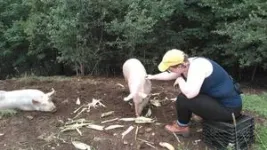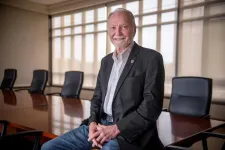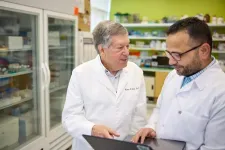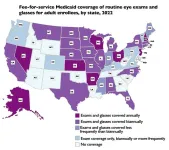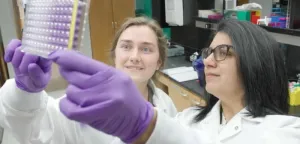(Press-News.org) A new University of Vermont study published today in Nature: Scientific Reports examines the social and psychological aspects of farmers’ decisions about whether or not to implement biosecurity measures on pig farms. This is the first study to look at human behavior in biosecurity adoption among swine producers.
Through survey data and simulations, the scientists found that it is largely farmers’ attitudes, which have the biggest impact on farmers’ decision-making strategies regarding implementing farm biosecurity. Farmer’s attitudes span a broad gamut from those who trust government information about diseases to a complete lack of belief that government recommendations can control an animal epidemic. Attitudes then will influence farmer’s behaviors such as when to contact their veterinarian, or when to ignore the signs of an outbreak.
Through surveys with over 440 swine producers the scientists were able to discern farmer’s perceptions about biosecurity adoption. They discovered that the farmers fell into three identifiable groups: Biosecurity Skeptics, Biosecurity Compliant, and Biosecurity Ultra-Compliant. These classification groups of pig producers significantly predicted their biosecurity actions or lack thereof.
Swine research is of the upmost importance currently as the 2018 African Swine Fever (ASF) epidemic in China resulted in the culling of 40 million pigs. Between 2019 and 2021 Vietnam was forced to cull 6 million pigs. If the ASF were to infect the US swine population it would have devastating consequences. The United States holds a prominent position as both a producer and consumer of pork and pork products, and any disruption would have dire economic repercussions. As of 2021, the pork industry directly and indirectly contributed about $57.20 billion in value to the U.S. economy. An single confirmed ASF infection in the US swine population could bring down the entire industry. Against this backdrop of global threat and impending calamity, policy makers need to be able to create targeted communications that encourage biosecurity adoption, so as to reduce the likelihood of a US outbreak. In order to do that, they need more information about how to best influence producers to adopt biosecurity measures.
Probably the most important finding of the UVM study is that swine producer attendance at even a single eradication program, did encourage biosecurity adoption, even amongst those in the Biosecurity Skeptics group. The biggest surprises of the study: Small scale swine producers are the least likely to adopt biosecurity measures, and distrust of the government plays a key role in farmer’s resistance.
One of the principal investigators, Richmond Silvanus Baye said he was inspired to do this research because of a similar study done in 2012 which looked at cattle biosecurity adoption in the wake of the devastating Foot and Mouth Disease outbreak in the UK. During that epidemic many cattle producers refused to allow the British Government onto their property to destroy infected animals, therein prolonging and worsening the outbreak.
The UVM investigators want to understand how it might be possible to move the needle on psychological resistance before an outbreak is underway. They examined how federal insurance programs, other indemnity programs, and educational outreach might be used to motivate swine producers’ reporting of sick animals, as well as to improve biosecurity compliance to prevent an outbreak, or to lessen its impact should it arrive on US soil. Their research is grounded in the assumption that preventative measures are more efficient and cost effective than reactive or curative measures once an outbreak is underway.
According to principal investigator Asim Zia, one key take away of the study is that it shows a path for improvement if the USDA choses to adopt a new approach, “Current USDA biosecurity policy, incorporated in the Farm Bill, does not account for behavioral and psychological responses embedded in unconditional indemnity of losses from animal diseases such as African Swine Fever. This research shows that switching the current USDA policy from unconditional indemnity of losses to conditional indemnity, (conditional on adoption of biosecurity) will build more resilience against animal disease incursions in the US. The conditional indemnity approach will provide market incentives to pig producers to adopt biosecurity.”
Researcher Scott Merrill describes the importance of their study this way, “These days almost all of the wicked problems that we are facing are inherently driven by human decisions, whether those problems are exceptionally large such as climate change and food security, or more nuanced such as the health of our livestock herds. Yet, much of the scientific inquiry into these problems revolves around things that are easier to test. For example, we spent a lot of time examining the effectiveness of vaccines but spent less time trying to make sure that people would be willing to get a vaccine. So, science that examines and incorporates findings on human behavior and how people make decisions, can lead to substantial insights that have the capacity to really impact society, and reduce the costs associated with challenging problems.”
Studying an impending, global pandemic on the heels of Covid might make one feel pessimistic, that viruses cannot be contained by national borders, but Baye says he feels optimistic about their findings. “Because an outbreak of this disease would have such a negative impact on our GDP, all the stakeholders will need to come together to nudge all the groups to become more compliant. The good news is that we have many pig producers in the Ultra Compliant and Compliant groups, and we’ve found that policies can be used to encourage the middle to adopt additional biosecurity measures. If we educate the skeptics, there is a lot we can do to encourage investment in biosecurity, so that gives us hope. If we encourage people enough, and understand what motivates them, then we might be able to prevent this from entering the U.S.”
END
Attitudes such as distrust of government can cause swine farmers to resist animal biosecurity: UVM study finds
First study of how swine farmers attitudes affect biosecurity shows that farmers attending just one biosecurity education event led to improved farm biosecurity
2024-08-06
ELSE PRESS RELEASES FROM THIS DATE:
Scientists reach consensus for fasting terminology
2024-08-06
Dr. Eric Ravussin of Pennington Biomedical Research Center in Baton Rouge was one of 38 scientists from five continents to present the first international consensus on fasting terminology and key definitions. Published in Cell Metabolism, the recent study reflects the increasing popularity of diets tied to fasting and a significant increase in scientific studies of fasting. While the application of fasting is rapidly growing, there was previously no globally established terminology.
The panel was the first to bring ...
C-Path welcomes new advisory members to Alpha-1 Antitrypsin Deficiency consortium
2024-08-06
TUCSON, Ariz., August 6, 2024 — Critical Path Institute’s (C-Path) Critical Path for Alpha-1 Antitrypsin Deficiency (CPA-1) consortium today announced the addition of several key advisory members. The new members, recognized experts in their respective fields and patient advocacy organizations, will contribute their significant expertise to the consortium’s mission to accelerate drug development for Alpha-1 Antitrypsin Deficiency (AATD), a rare genetic disorder.
Joining the consortium are:
Alpha-1 Foundation
COPD Foundation
Global ...
Drug bypasses suppressive immune cells to unleash immunotherapy
2024-08-06
By recruiting the immune system to combat tumor cells, immunotherapy has improved survival rates, offering hope to millions of cancer patients. However, only about one in five people responds favorably to these treatments.
With a goal of understanding and addressing immunotherapy’s limitations, researchers at Washington University School of Medicine in St Louis have found that the immune system can be its own worst enemy in the fight against cancer. In a new study in mice, a subset of immune cells – type 1 regulatory T cells, or Tr1 cells – did its normal job of preventing the immune system from overreacting but did so while inadvertently restraining immunotherapy’s ...
Treatment with smoke can favor seed germination in the Cerrado
2024-08-06
For thousands of years, plants have evolved in the presence of wildfires in the Cerrado, Brazil’s savanna-like biome. Scientists at São Paulo State University (UNESP) studied the effect of smoke on seed germination for 44 plant species typical of the Cerrado, as reported in an article published in Plant Ecology, where they stress that their findings could be used to optimize the restoration of degraded areas.
The study was conducted by PhD candidate Gabriel Schmidt Teixeira Motta under the supervision of Rosana Marta Kolb, a professor at UNESP.
“Previous studies focused on the effect of smoke on only a few ...
Medicaid vision coverage for adults varies widely by state
2024-08-06
A study supported by the National Institutes of Health (NIH) shows that 6.5 million Medicaid enrollees (12%) lived in states without coverage for routine adult eye exams; and 14.6 million (27%) resided in states without coverage for eyeglasses. The study based on 2022-23 coverage policies, published in Health Affairs, is among the first to provide a comprehensive, state-by-state analysis of adult Medicaid benefits for basic vision services in both fee-for-service and managed care.
Medicaid provides health coverage to millions of Americans, including eligible low-income adults, children, pregnant women, elderly ...
Chemical and nutritional profile of fruit, vegetables and co-produts to improve human health
2024-08-06
A new study emphasizes the vital role of fruits, vegetables, and their co-products in boosting human health and life expectancy. Packed with minerals, vitamins, and dietary fiber, these foods help prevent chronic diseases. Antioxidants in fruits and vegetables, such as vitamins and carotenoids, combat harmful free radicals.
Interested in more information and in contributing to the topic, visit: bit.ly/46zTKFX
Combining various fruits like oranges, apples, grapes, and blueberries enhances antioxidant effects. Diets rich in these foods can lower blood pressure, reduce heart disease and ...
Better cancer trial representation begins with speaking one’s language
2024-08-06
NEW YORK, NY (July 29, 2024) ---- Underrepresentation of racial and ethnic minority populations in cancer clinical trials persists partly because translation and interpretation services and resources are unavailable or inadequate in the United States, according to a Children’s Oncology Group (COG) study led by Columbia University School of Nursing. The updated study was published online in the Journal of the National Cancer Institute Cancer Spectrum on July 25, 2024 and will appear in the August 2024 journal issue.
In 2019, 68 million people in the United States were reported to speak a language other than ...
Social and structural factors are key drivers of disparities in obesity rates
2024-08-06
Obesity is an epidemic in the United States. It has been increasing among adults of all races and ethnicities over the last two decades; however, obesity is higher among Non-Hispanic Black adults, Hispanic adults, and American Indian or Alaska Native adults, than their White and Asian counterparts, according to the National Institutes of Health. Adults with lower income also have higher risk of obesity than those with a high income.
A George Mason University College of Public Health team of interprofessional researchers analyzed the last five years ...
New study helps global MNCs weigh the pros and cons of implementing blockchain technology
2024-08-06
Blockchain technology has become one of the most hyped advancements in recent years, but there hasn’t been a clear understanding of the potential trade-offs for its use by multinational corporations (MNCs). A new study published in the Global Strategy Journal provides a better understanding of blockchain merits and drawbacks by focusing on three particular applications of the technology in this sector: financial transactions, collaboration, and data analytics.
The study, “A perspective on three trade-offs of blockchain technology for the global strategy of the MNC,” was authored by Tuuli Hakkarainen of the University of Liverpool, Anatoli Colicev of the University ...
Increased ventilation not effective in reducing influenza virus spread in play-based model, Emory study finds
2024-08-06
Increasing ventilation in child-care settings may not always be effective at preventing flu virus spread, according to a new study published by a team of researchers at Emory University, University of Pittsburgh School of Medicine, and Virginia Tech.
The spread of flu viruses is commonly studied in animal models that don’t mimic the real-life scenarios of the human experience, making it difficult to evaluate strategies that will be effective in common places where disease spreads rapidly, such as childcare settings. As reported online and in a coming print issue of the journal Proceedings of the National ...
LAST 30 PRESS RELEASES:
Hope for global banana farming in genetic discovery
Mirror image pheromones help beetles swipe right
Prenatal lead exposure related to worse cognitive function in adults
Research alert: Understanding substance use across the full spectrum of sexual identity
Pekingese, Shih Tzu and Staffordshire Bull Terrier among twelve dog breeds at risk of serious breathing condition
Selected dog breeds with most breathing trouble identified in new study
Interplay of class and gender may influence social judgments differently between cultures
Pollen counts can be predicted by machine learning models using meteorological data with more than 80% accuracy even a week ahead, for both grass and birch tree pollen, which could be key in effective
Rewriting our understanding of early hominin dispersal to Eurasia
Rising simultaneous wildfire risk compromises international firefighting efforts
Honey bee "dance floors" can be accurately located with a new method, mapping where in the hive forager bees perform waggle dances to signal the location of pollen and nectar for their nestmates
Exercise and nutritional drinks can reduce the need for care in dementia
Michelson Medical Research Foundation awards $750,000 to rising immunology leaders
SfN announces Early Career Policy Ambassadors Class of 2026
Spiritual practices strongly associated with reduced risk for hazardous alcohol and drug use
Novel vaccine protects against C. diff disease and recurrence
An “electrical” circadian clock balances growth between shoots and roots
Largest study of rare skin cancer in Mexican patients shows its more complex than previously thought
Colonists dredged away Sydney’s natural oyster reefs. Now science knows how best to restore them.
Joint and independent associations of gestational diabetes and depression with childhood obesity
Spirituality and harmful or hazardous alcohol and other drug use
New plastic material could solve energy storage challenge, researchers report
Mapping protein production in brain cells yields new insights for brain disease
Exposing a hidden anchor for HIV replication
Can Europe be climate-neutral by 2050? New monitor tracks the pace of the energy transition
Major heart attack study reveals ‘survival paradox’: Frail men at higher risk of death than women despite better treatment
Medicare patients get different stroke care depending on plan, analysis reveals
Polyploidy-induced senescence may drive aging, tissue repair, and cancer risk
Study shows that treating patients with lifestyle medicine may help reduce clinician burnout
Experimental and numerical framework for acoustic streaming prediction in mid-air phased arrays
[Press-News.org] Attitudes such as distrust of government can cause swine farmers to resist animal biosecurity: UVM study findsFirst study of how swine farmers attitudes affect biosecurity shows that farmers attending just one biosecurity education event led to improved farm biosecurity

